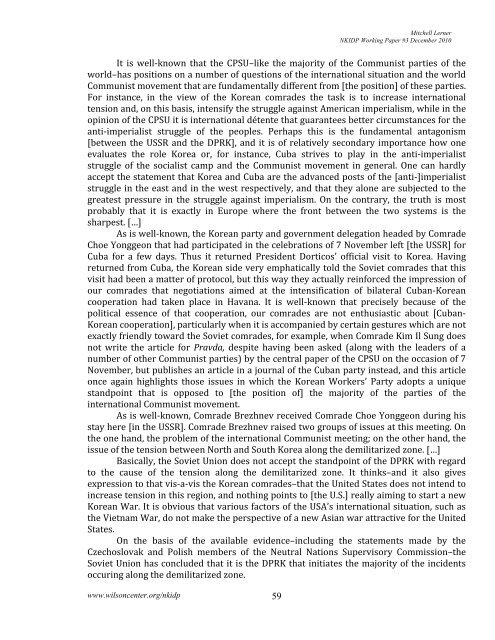"Mostly Propaganda in Nature:" Kim Il Sung, the Juche Ideology, and ...
"Mostly Propaganda in Nature:" Kim Il Sung, the Juche Ideology, and ...
"Mostly Propaganda in Nature:" Kim Il Sung, the Juche Ideology, and ...
You also want an ePaper? Increase the reach of your titles
YUMPU automatically turns print PDFs into web optimized ePapers that Google loves.
www.wilsoncenter.org/nkidp<br />
Mitchell Lerner<br />
NKIDP Work<strong>in</strong>g Paper #3 December 2010<br />
It is well‐known that <strong>the</strong> CPSU–like <strong>the</strong> majority of <strong>the</strong> Communist parties of <strong>the</strong><br />
world–has positions on a number of questions of <strong>the</strong> <strong>in</strong>ternational situation <strong>and</strong> <strong>the</strong> world<br />
Communist movement that are fundamentally different from [<strong>the</strong> position] of <strong>the</strong>se parties.<br />
For <strong>in</strong>stance, <strong>in</strong> <strong>the</strong> view of <strong>the</strong> Korean comrades <strong>the</strong> task is to <strong>in</strong>crease <strong>in</strong>ternational<br />
tension <strong>and</strong>, on this basis, <strong>in</strong>tensify <strong>the</strong> struggle aga<strong>in</strong>st American imperialism, while <strong>in</strong> <strong>the</strong><br />
op<strong>in</strong>ion of <strong>the</strong> CPSU it is <strong>in</strong>ternational détente that guarantees better circumstances for <strong>the</strong><br />
anti‐imperialist struggle of <strong>the</strong> peoples. Perhaps this is <strong>the</strong> fundamental antagonism<br />
[between <strong>the</strong> USSR <strong>and</strong> <strong>the</strong> DPRK], <strong>and</strong> it is of relatively secondary importance how one<br />
evaluates <strong>the</strong> role Korea or, for <strong>in</strong>stance, Cuba strives to play <strong>in</strong> <strong>the</strong> anti‐imperialist<br />
struggle of <strong>the</strong> socialist camp <strong>and</strong> <strong>the</strong> Communist movement <strong>in</strong> general. One can hardly<br />
accept <strong>the</strong> statement that Korea <strong>and</strong> Cuba are <strong>the</strong> advanced posts of <strong>the</strong> [anti‐]imperialist<br />
struggle <strong>in</strong> <strong>the</strong> east <strong>and</strong> <strong>in</strong> <strong>the</strong> west respectively, <strong>and</strong> that <strong>the</strong>y alone are subjected to <strong>the</strong><br />
greatest pressure <strong>in</strong> <strong>the</strong> struggle aga<strong>in</strong>st imperialism. On <strong>the</strong> contrary, <strong>the</strong> truth is most<br />
probably<br />
that it is exactly <strong>in</strong> Europe where <strong>the</strong> front between <strong>the</strong> two systems is <strong>the</strong><br />
sharpest. […]<br />
As is well‐known, <strong>the</strong> Korean party <strong>and</strong> government delegation headed by Comrade<br />
Choe Yonggeon that had participated <strong>in</strong> <strong>the</strong> celebrations of 7 November left [<strong>the</strong> USSR] for<br />
Cuba for a few days. Thus it returned President Dorticos’ official visit to Korea. Hav<strong>in</strong>g<br />
returned from Cuba, <strong>the</strong> Korean side very emphatically told <strong>the</strong> Soviet comrades that this<br />
visit had been a matter of protocol, but this way <strong>the</strong>y actually re<strong>in</strong>forced <strong>the</strong> impression of<br />
our comrades that negotiations aimed at <strong>the</strong> <strong>in</strong>tensification of bilateral Cuban‐Korean<br />
cooperation had taken place <strong>in</strong> Havana. It is well‐known that precisely because of <strong>the</strong><br />
political essence of that cooperation, our comrades are not enthusiastic about [Cuban‐<br />
Korean cooperation], particularly when it is accompanied by certa<strong>in</strong> gestures which are not<br />
exactly friendly toward <strong>the</strong> Soviet comrades, for example, when Comrade <strong>Kim</strong> <strong>Il</strong> <strong>Sung</strong> does<br />
not write <strong>the</strong> article for Pravda, despite hav<strong>in</strong>g been asked (along with <strong>the</strong> leaders of a<br />
number of o<strong>the</strong>r Communist parties) by <strong>the</strong> central paper of <strong>the</strong> CPSU on <strong>the</strong> occasion of 7<br />
November, but publishes an article <strong>in</strong> a journal of <strong>the</strong> Cuban party <strong>in</strong>stead, <strong>and</strong> this article<br />
once aga<strong>in</strong> highlights those issues <strong>in</strong> which <strong>the</strong> Korean Workers’ Party adopts a unique<br />
st<strong>and</strong>po<strong>in</strong>t that is opposed to [<strong>the</strong> position of] <strong>the</strong> majority of <strong>the</strong> parties of <strong>the</strong><br />
<strong>in</strong>ternational Communist movement.<br />
As is well‐known, Comrade Brezhnev received Comrade Choe Yonggeon dur<strong>in</strong>g his<br />
stay here [<strong>in</strong> <strong>the</strong> USSR]. Comrade Brezhnev raised two groups of issues at this meet<strong>in</strong>g. On<br />
t he one h<strong>and</strong>, <strong>the</strong> problem of <strong>the</strong> <strong>in</strong>ternational Communist meet<strong>in</strong>g; on <strong>the</strong> o<strong>the</strong>r h<strong>and</strong>, <strong>the</strong><br />
issue of <strong>the</strong> tension between North <strong>and</strong> South Korea along <strong>the</strong> demilitarized zone. […]<br />
Basically, <strong>the</strong> Soviet Union does not accept <strong>the</strong> st<strong>and</strong>po<strong>in</strong>t of <strong>the</strong> DPRK with regard<br />
to <strong>the</strong> cause of <strong>the</strong> tension along <strong>the</strong> demilitarized zone. It th<strong>in</strong>ks–<strong>and</strong> it also gives<br />
expression to that vis‐a‐vis <strong>the</strong> Korean comrades–that <strong>the</strong> United States does not <strong>in</strong>tend to<br />
<strong>in</strong>crease tension <strong>in</strong> this region, <strong>and</strong> noth<strong>in</strong>g po<strong>in</strong>ts to [<strong>the</strong> U.S.] really aim<strong>in</strong>g to start a new<br />
Korean War. It is obvious that various factors of <strong>the</strong> USA’s <strong>in</strong>ternational situation, such as<br />
<strong>the</strong> Vietnam<br />
War, do not make <strong>the</strong> perspective of a new Asian war attractive for <strong>the</strong> United<br />
States.<br />
On <strong>the</strong> basis of <strong>the</strong> available evidence–<strong>in</strong>clud<strong>in</strong>g <strong>the</strong> statements made by <strong>the</strong><br />
Czechoslovak <strong>and</strong> Polish members of <strong>the</strong> Neutral Nations Supervisory Commission–<strong>the</strong><br />
Soviet Union has concluded that it is <strong>the</strong> DPRK that <strong>in</strong>itiates <strong>the</strong> majority of <strong>the</strong> <strong>in</strong>cidents<br />
occur<strong>in</strong>g along <strong>the</strong> demilitarized zone.<br />
59

















